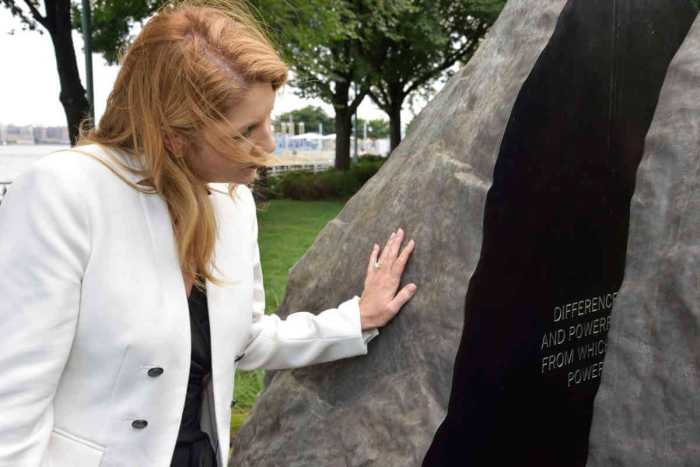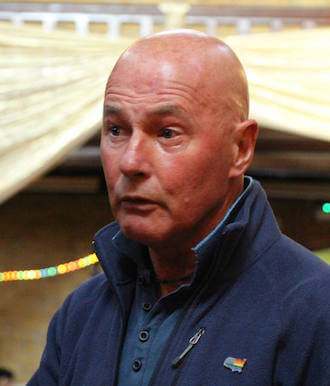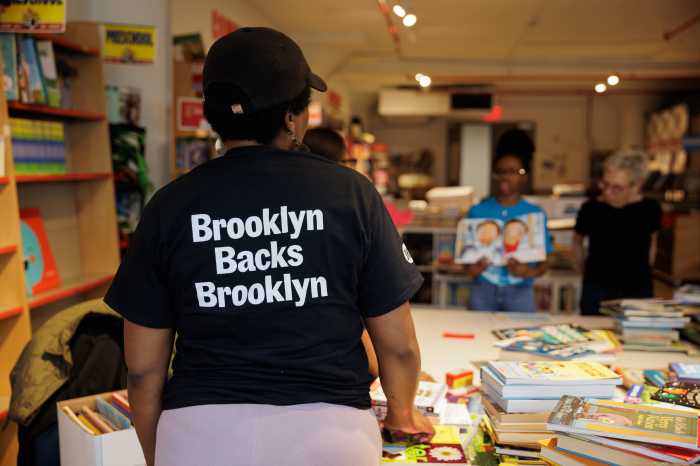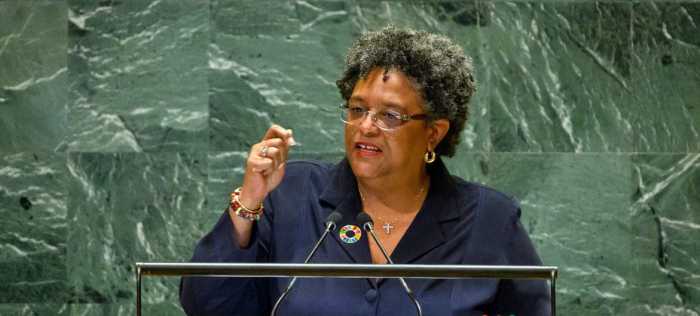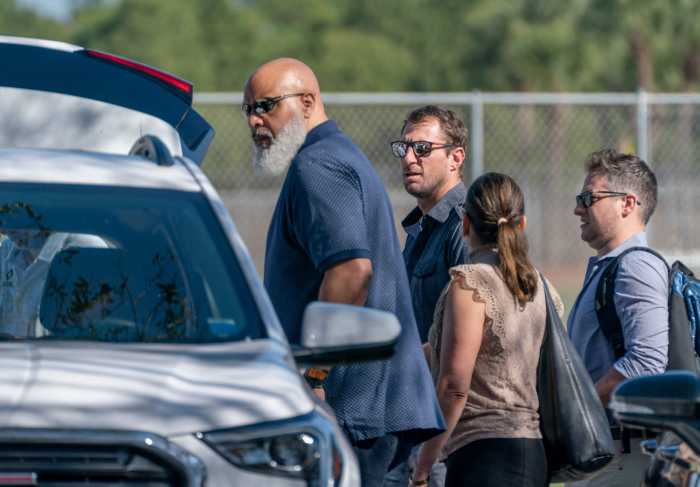Adam Davidson appears as Matthew Shepard in the in the Wandering Theatre Company’s production of “The Laramie Project Cycle.” | COURTESY OF ADAM DAVIDSON
For the past 10 months I’ve had the privilege and responsibility of representing Matthew Shepard in the Wandering Theatre Company’s production of “The Laramie Project.” As far as we know, this is the first time Matthew has been part of “The Laramie Project Cycle.” To add someone we lost almost 20 years ago now not only comes with the challenge and responsibility of paying tribute to a real human being — one who had no voice in the wake of a hate crime that led to his murder — it also adds a gravity for a new generation of audience members who are now used to the quick and often harsh intake of information and social media communication. The show my fellow ensemble members perform moves me every time I experience the show, and the feedback we have received has been both gratifying and humbling.
Matt and I have a lot in common, more than I originally anticipated. More in common than I think I’ll ever be comfortable with. I was born and raised in a picture-postcard kind of town, just off the cape of Florida, and grew up safely ensconced in your average middle-class American family. I grew up white, with an overwhelming amount of blonde hair and eyes that change between gray, green, and blue. I grew up very privileged — something I wouldn’t have even understood at the time had you tried to tell that to a closeted teenager.
It was a town like a lot of others, that lived by the time-worn motto of “live and let live,” a phrase repeated by several individuals in “The Laramie Project.” I also grew up hiding with all my might that I was gay — and later realized how my family must have known early on. I look back and I’m confused how something could ever have made me question their support and love for me. But the signals we get from our communities, schools, churches and often families send the message of “don’t ask, don’t tell.” Jonas Slonaker, a Laramie resident, puts it even more bluntly in the play: “What it boils down to: if I don’t tell you I’m a fag, you won’t beat the crap out of me. I mean, what’s so great about that? That’s a great philosophy?” Hard to argue with him.
The power and challenge of a “Laramie Project” where Matthew Shepard is present
So, we grow up as wallflowers, mimicking others’ motions, absorbing anything and everything you can to smother the feeling that you are different. At that age, micro-aggressions and passing normative phrases such as “That’s gay!,” “Don’t be a pussy,” “He can’t have the pink one,” and more can turn to more vicious forms of hate, from name-calling to violence to the ugly signs displayed at Matthew’s funeral and the rhetoric from the Westboro Baptist Church’s Fred Phelps: “If God doesn’t hate fags, why does he put ’em in hell?”
All too often the words spoken by real people around us — teachers, friends, and family — can create mountains that we will either climb or they crush us. I watched my best friend in high school maneuver around comments like “You’re the whitest black girl I know,” “You’re hardly black,” “Can I touch your hair?” She was even given the nickname “TBO, token black one.” Comments that as two confused kids who knew nothing more than this world we had absorbed as our normal.
Luckily, most of the kids who were different made it out and moved on to a life that celebrates their differences. She and I both admit to this day that we wouldn’t have survived those years without the other one by our side.
Even 20 years after Matt’s death and what seems like a lot of progress, there are far too many LGBTQ youth who don’t get to find a light at the end of a bleak tunnel. Some face a darkness worse than their heart can hold and they give up on the hope of a life worth living. Too many end up on the streets, rejected by family or escaping that rejection, the targets of exploitation and violence. I think about how Matt’s story is still so relevant, as hate crimes not only continue to happen but have actually spiked since the 2016 election. Many of the actors in our company — and so many audience members — were children or not even born yet when his murder happened, which is part of why it is so important to continue to tell this story, to perform this play, and, as our company decided, to give Matt a role in “The Laramie Project.” He was a very real young man filled with hope and promise, and the role I play, wordlessly, makes Matt a real presence, not simply a photo on the Internet.
So I stand watching across from the fence and I think of the boy who was scared to death to tell his mother who he was. I think of anyone who has lost anyone from this form of hate. I think of all the other kids out there who are hiding inside themselves, who still experience this hatred day to day as their normal. I think about Matt’s parents, who are still working to make a difference after all this time has past, not just for Matt but for all the thousands of other victims of hate — gay, lesbian, bisexual, transgender, immigrants, people of color, anyone targeted simply because of who they are or who they love.
“The Laramie Cycle” for me has always been about a lot more than Matthew Shepard’s story. This is not only the first time since BAM’s production in 2013 that “The Cycle” has been presented professionally in New York City, but also the first time presented in such an innovative way.
The addition of a Matthew Shepard in the cast is unique and done with the greatest respect — with his memory, his spirit, his soul moving like “the ever present Wyoming wind” through the series of interviews.
Each rehearsal and at every show, I watch the town of Laramie, much like the one I loved growing up, from a fence. My heart is filled with the hope that every audience member — family, friends, strangers, straight, male, female, gay, lesbian, bi, queer, trans, all races and ages — is moved to action. To learn. To understand. To begin erasing hate, in and outside the LGBTQ community.
Before these past 10 months, I had no clue how to express my voice amongst the erupting divisiveness and hate, because words spoken out loud for me don’t come easy, but I’m finding my voice. My hope is to extend the same hand to hold that Matt gave me.
It’s important to continue to talk about Matt, it’s important to talk about the media, it’s important to talk about the crime — and all the hate crimes that have happened since — and it’s important to talk about how things can indeed change.
In a courtroom statement, Matt’s father Dennis said, “Matt’s death has sparked a worldwide conversation about hate… good is coming out of evil.” And the words of Matt’s mother Judy are always with me: “Bring light where you see darkness. Bring freedom where you see fear and begin to heal.”
Adam Riggs has been with the Wandering Theatre Company’s production of “The Laramie Project” for its three runs to date. He is a New York-based performer and artist with a BFA in Commercial Dance from Pace University.
THE LARAMIE PROJECT CYCLE | Access Theater Black Box, 380 Broadway at White St., fourth fl. | “Part One: The Laramie Project”: Feb. 22, 24 & 28, Mar. 2 at 8 p.m. ; “Part Two: Ten Years Later”: Feb. 23 & 25; Mar. 1 & 3 at 8 p.m. | Tickets are $32 at thewanderingtheatrecompany.org/laramie/production



